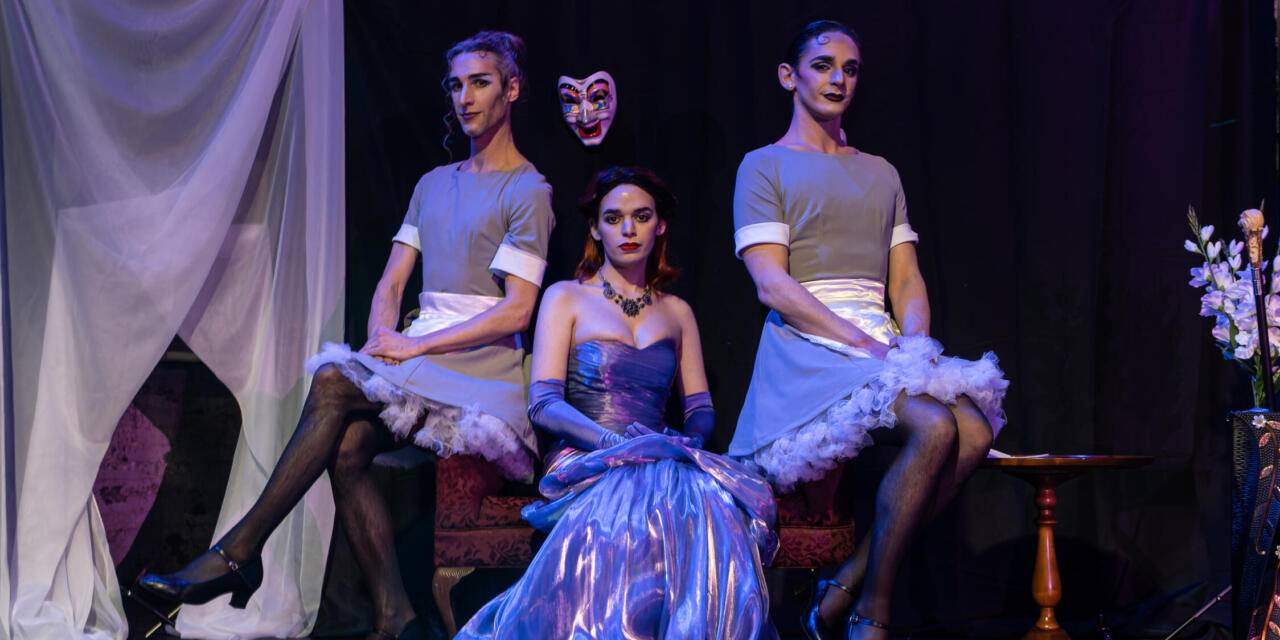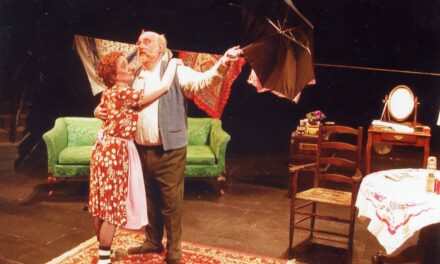Dedicated to the 70th anniversary of the first publication and production of Jean Genet’s unique play – The Maids.
“I renounce the world that renounces me.”
Jean Genet
The original version of the play The Maids was written in 1947, four years after the publication of Jean Genet’s debut autobiographical novel – Our Lady of the Flowers (Notre-Dame-des-Fleurs), which made Genet extremely famous in France. That same year, the play was produced at the Théâtre de l’Athénée in Paris, however, subsequently, the play was reworked by the author and heavily abridged.
In 1954 the new edition of The Maids was published and presented in Paris. That very “short” version of the play has been used in various theatrical productions in France, as well as other countries, since.
In most productions – the roles of the maids were played by women, to the author’s disdain, who originally indicated that all the female roles must be “played by men and only men.” Their “gestures and tones must be exaggerated and tragic,” and the actors’ voices need to sound “guttural, animalistic, coming from anywhere but the throat.” The makeup, according to the author, must “transform them completely” into something they are not – such total transformation allows them “any impertinence.” Despite the many detailed directions and explanations for both directors and actors, left by Jean Genet, a production that would satisfy his vision did not occur during his lifetime. However, from the late 40s into the late 60s of the past century there were many attempts to produce the play with the full male casts, as well as combined. Since 1962 several film versions have appeared, created by Scandinavian, German, and British directors. Especially the film adaptation of 1975, directed by Christopher Miles boosted the English-speaking spectators’ interest in the play.
The first Off-Broadway production appeared in the US in 1955 with Julia Anne Bovasso as Claire and later as Solange. She won the first Best Actress Obie Award (1956) for The Maids. In Gerard Murphy’s production of 1987, realized in London by the Royal Shakespeare Company, finally, all roles were played by male-identifying actors [Miles Anderson as Claire, Gerard Murphy as Solange, Patrick Bailey as Madame].
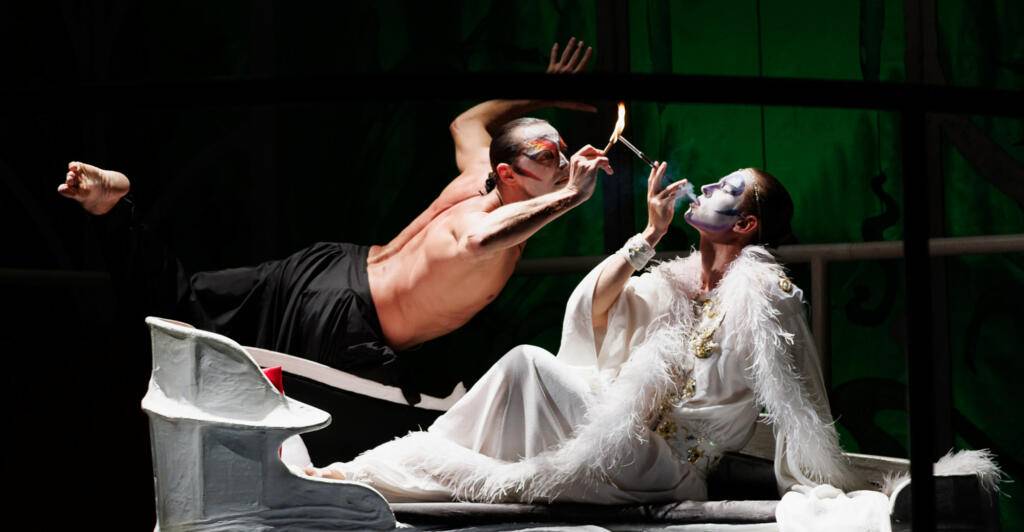
The Maids, directed by Roman Viktyuk. (L)- Dmitry Bozin as Solange, (R) – Aleksey Nesterenko as Madame/ Photo credit by Polina Kapitsa
In 1988, a young Russian Ukrainian-born theatre director – Roman Viktyuk, directed a new production of The Maids at the Satyricon Theatre in Moscow City. For the first time, the director fully follows Genet’s instructions. High-fashion glam make-up, epatage, animalistic movements, pretentious and modern choreography in dance numbers, hollow voices, “over the top” acting, a musical mix of pop-ballades and French chanson, sentimental instrumental music and Verdi’s Requiem: such an enchanting spectacle, or as maestro Viktyuk called it – “a theatrical ritual,” shocked the spectators at the time. Special plasticity and choreography were created for the actors. Konstantin Raikin played the role of Solange and Nikolai Dobrynin – the role of Claire. Over the 35 years of its existence, the play went through three editions (1992, 2006, 2021.) Spectators from more than forty countries had the opportunity to see the show. In February 2011 Viktyuk’s The Maids conquered Washington, Chicago, and New York.
The play is still running in Moscow, performed on the stage of the Teatr Viktuka (The Theatre of Roman Viktyuk). And always with full houses, just like 35 years ago. The Maids – is the living monument to the last romantic of the Russian Theatre – the great director and mentor, that left us in 2020. In one of his interviews, when asked about Jean Genet, Roman Viktyuk answered: “Genius. He – a writer, who possesses creative imagination and the comprehension of time, he foresaw things years ahead. Perhaps because he experienced humiliation, being in jail, he took in such qualities, that turn the soul prophetic. Genet is a unique phenomenon.” It is quite interesting – what motivated Viktyuk to choose specifically this play by Genet to apply his genius as a director to? He knew of Jean Genet’s passionate desire – to stage this play in an actual prison. “I have made it come true, that dream of Genet’s, – shared Viktyuk. – Russia – has always been “the prison of the people.” And in the very heart of that prison – in its capital, this play took place.”
Comparing the French, German, and Polish productions of the play, Viktyuk said: “When the women played all the roles, they played a “kitchen drama,” they portrayed some housewives… some aggressive individuals clasped at their throats. And all in vain.” He considered it most important – to show, how in the maids “from their aggression and the desire to kill Madame, the inhuman energy,… the animalistic primal origin – bursts through.” Even though Genet dreamed of a very specific entrance for Madame, describing it in the first mise en scene, almost none of the directors who previously worked on the play before Viktyuk, paid attention to it or considered it important. It is interesting that for Madame’s first entrance, the director chose Daniel Lavoie’s legendary song Ils s’aiment. The famous single celebrates its 40th anniversary this year and will be included in the brand new album of the composer and singer – Daniel Lavoie.
No matter what the future in Russia holds for this genius creation by Roman Viktyuk, his production is and shall forever remain one of the best productions of The Maids there ever was, in any case – it is extremely unique and unreproducible.
Over the last decade, the interest in this play by Jean Genet grew. One should mention several successful productions: Canadian (2011), where the cast was mixed; Australian production in Sydney (2013) with a female cast (Cate Blanchett as Claire, Elizabeth Debicki as Madame, Isabelle Huppert as Solange), later performed as part of a theatre festival at the Lincoln Center in New York (2014) in an updated version: new soundtrack, contemporary devices, stylized choreography (director and choreographer – Anne Teresa De Keersmaeker). In 2016 that very production reached London, where only one of the maids was played by a male-identifying actor.
In 2016 the Outliers Theatre Co. presented an “intimate” production of The Maids, directed by Ben Gunderson, at the Access Theatre. We asked the star of the production – the elegant Madame – Pooya Mohseni, an Iranian American trans actress, writer, filmmaker, and trans activist, to share with us her experience of working on this amazing play.
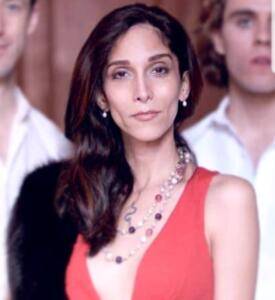
The Maids, Outliers Theatre Co. production, NYC 2016. (C) – Pooya Mohseni as Madame/ From Pooya Mohseni’s personal archive
Lisa Monde: Seven years ago, you played Madame. And it was unprecedented – you are the first trans actress playing the role of Madame. What new perspective does it offer you for the character, being a transgender actress?
Pooya Mohseni: I can’t separate being a trans actor from who I am as a human being. I am always proud to be a part of a queer production where you can show what you as a community have to offer and present it to the world.
LM: How did you create the character of Madame? What was your approach?
PM: Madame has two sides to her: there is always a shift: where Madame starts playing a different role in front of the maids than when she is by herself. When she is in front of the maids, it’s like she’s been conditioned – “I am the lady of the house, this is how I speak and this is how I conduct myself.” And when she is by herself – you get to see her fears and insecurities. Madame is unhappy and scared. And she doesn’t want to play the role and that’s the tension within her. Madame is a tragic figure, you see her humanity but she can’t stop sinking, just like the two maids.
LM: Where did you find inspiration for Madame?
PM: I’m a movie buff, so I watched a lot of melodramas from the 40s, 50s, and 60s, the famous dames of the silver screen like Joan Crawford, Betty Davis, Eleanor Parker, and Elizabeth Taylor. I envisioned Glenn Close playing Madame. But it was mainly me trying to find the truth of that character within me – the idea that when things are going bad and I can’t find a solution, I’d cause myself pain and then I wouldn’t have to worry about my imploding soul. Consciously it all came from me, but subconsciously it came from so many things I’ve seen plus my own experiences in life. Everything we’ve seen, heard, and experienced – becomes part of our acting vocabulary. But the emotional truth is crucial.
LM: How did you build your relationship with the maids? How did your Madame feel about Claire and Solange?
PM: Madame is above the maids, they are for her to do with as she wishes, even when Madame is dancing with Claire – what is she really doing? I felt like I could do whatever I wanted, I was hurting and I was going to amuse myself, dancing with Claire, putting make-up on her, being too intimate with her – the maids were mine, I was Madame. It shows what is servitude really – the maids are objects, they belong to other people, and they are not humans. The essence of the darkness of this play is what happens to people when they are not treated as people. That anger, hatred, and violence, that the maids harbor towards Madame, Monsieur, and each other. This play is special – it is about servants, which at the time, if you think about it – is unusual, you would have done the play about Madame, and here the focus gets switched around.
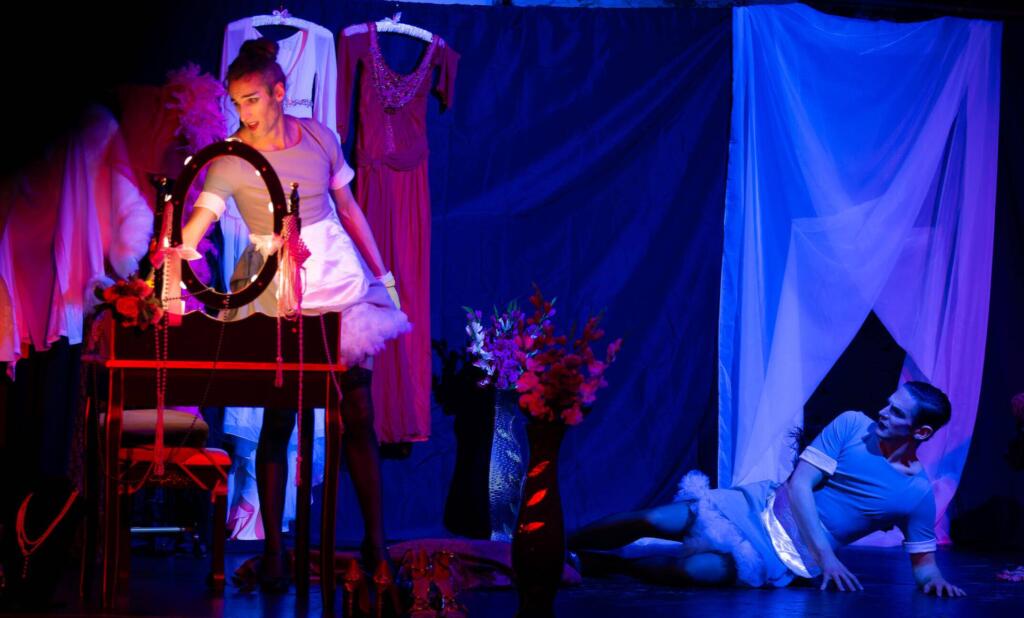
The Maids, Monli International Company LLC production. 3 Dollar Bill, NYC 2023. (L) – Scott Lilly as Solange, (R)- Dyllan Vallier as Claire/ Photo credit by Shane Maritch
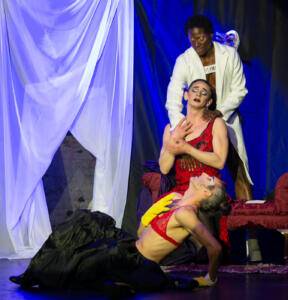
The Maids, Monli International Company LLC production, 3 Dollar Bill, NYC 2023. Jeanathan Lei as the Milkman, Dyllan Vallier as Claire, Scott Lilly as Solange/ Photo credit by Shane Maritch
The latest theatrical production of Jean Genet’s The Maids, premiered in New York in 2023, produced by Monli International Company LLC in a new adaptation. This time, the show was directed following the author’s testament to a T: all female roles in the play were played by men (Scott Lilly as Solange, Dyllan Vallier as Claire), the role of Monsieur – was portrayed by a woman. Genet never mentioned anything about the gender of the actor who should play the mysterious Monsieur…
The role of Madame is performed by a trans actress – Alex Vaynerchuk, who created her own Madame, very different from Pooya Mohseni’s character.
For the first time, the character of the Milkman appeared on stage (portrayed by Jeanathan Lei), previously he was always left in the shadows. As it turned out, the Milkman was a great addition and livened up the scenery representing the maids’ sexual fantasies.
Currently, the show is running at the 3 Dollar Bill in Brooklyn, New York, once a month with limited engagement. The choice of this venue was not a random one – Jean Genet would have approved of his show playing at one of the most popular queer clubs in the city.
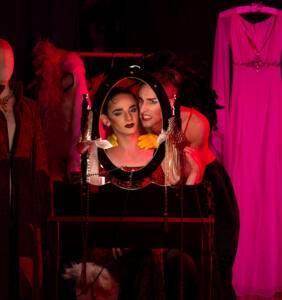
The Maids, Monli International Company LLC Production. 3 Dollar Bill, NYC 2023. (L)- Dyllan Vallier as Claire, (R)- Scott Lilly as Solange/ Photo credit by Shane Maritch
There is every reason to believe that the play The Maids, written over seventy years ago, will preserve its allurement for the contemporary directors as well as its spectators. Because this play is dedicated to one of the most important, common to all mankind, moral values – freedom. Roman Viktyuk perceived and sensed Genet deeply, he intricately summarized the main thesis of the play: “There can be no love in slavery. In slavery, one can hate and kill. And that must be avoided – one should steer clear of it in their soul, in relationships, and in society… That was the thought with which Genet left this world. And now, I guess, he is watching over us as we realize it.”
The next session of The Maids, produced by Monli, is planned for March 2024. Be on the lookout for the tickets at: https://www.3dollarbillbk.com/rsvp
This post was written by the author in their personal capacity.The opinions expressed in this article are the author’s own and do not reflect the view of The Theatre Times, their staff or collaborators.
This post was written by Lisa Monde.
The views expressed here belong to the author and do not necessarily reflect our views and opinions.

